WMIF MAIN SITE
2026 Event Site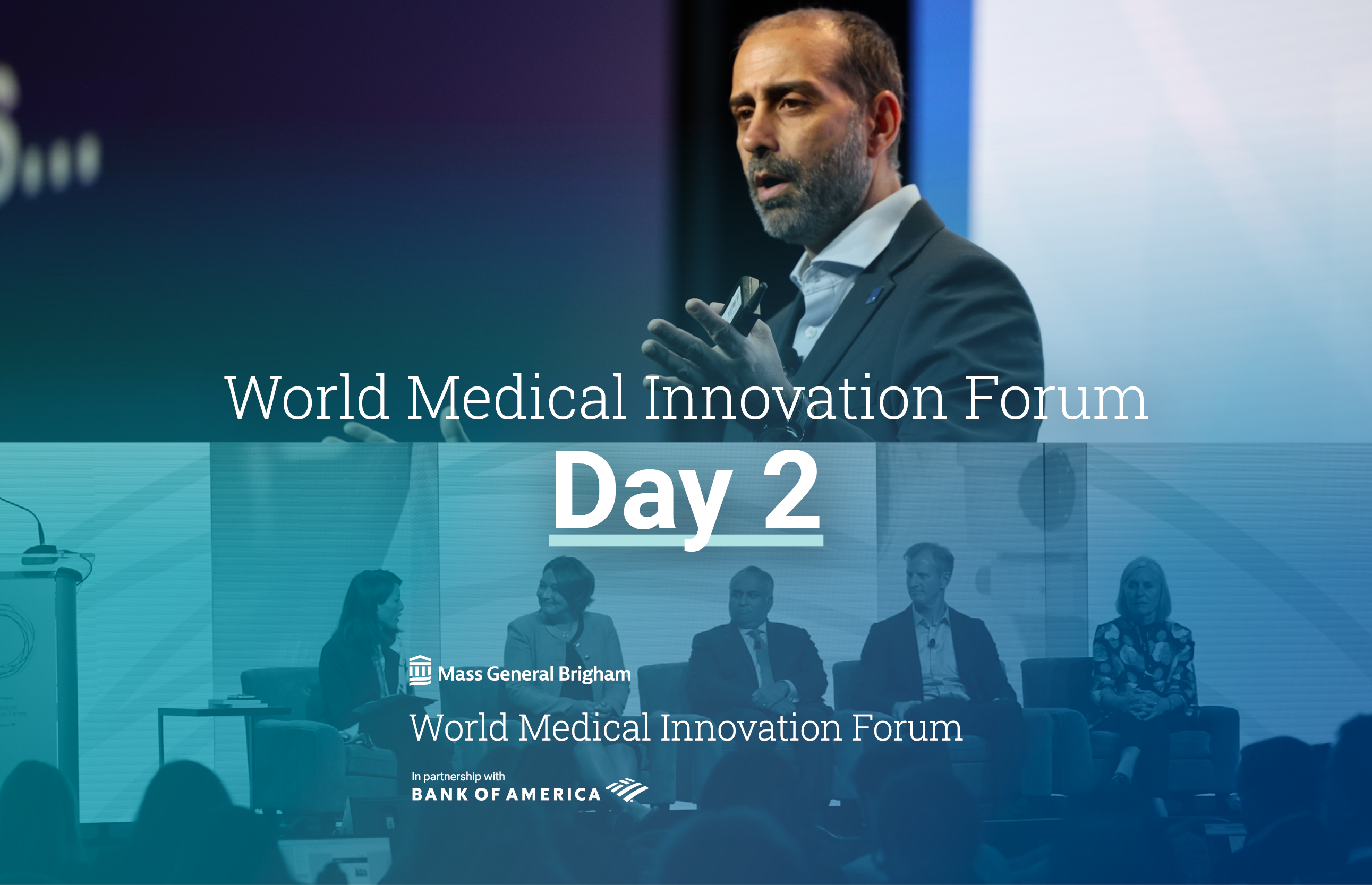
Liz Everett Krisberg, Head of Bank of America Institute, reflected on a “terrific first day” and previewed the groundbreaking discussions yet to come. She introduced Haim Israel, Head of Global Thematic Investing Research at BofA Global Research.
“You haven’t seen anything yet… generative AI is poised to transform life as we know it,” said Israel in opening his wide-ranging view of change via data and AI. He described overarching themes and disruptive technologies. Advancements in data utilization and more affordable processing power generate an astounding 329 quintillion bytes of data every day—equivalent to a million trillion bytes. Exponential growth in data will drive continuous innovations across various sectors, including healthcare, energy, weather forecasting, the job market, and life expectancy. AI is outpacing Moore’s Law by a factor of 3000 according to Israel.
When asked about potential unintended consequences, Israel responded “we don’t really know…this technology is going to change everything, and regulation typically lags behind innovation. As technology evolves rapidly, regulatory measures often fail to keep pace, resulting in growing gaps. This is a critical issue, and much of the responsibility will fall on individuals, companies, and the private market.”
Earliest Detection:
The delivery of care is pivoting as disruptive new technologies enable exceptionally early detection and drive significant shifts in care models.
Moderators James Brink MD, Enterprise Chief, Radiology, Mass General Brigham; Juan M. Taveras Professor of Radiology, Harvard Medical School, David Louis MD, Enterprise Chief, Pathology, Mass General Brigham; Benjamin Castleman Professor of Pathology, Harvard Medical School and Jason Zemansky PhD, SMid-Cap Biotech Analyst, BofA Global Research, led a discussion on the benefits and challenges of early disease detection in several specialties, including brain health, cardiology and early pregnancy.
Panelists also discussed that while not every rare disease has a specific treatment, options like MYC testing, bilateral mastectomy and oophorectomy can significantly reduce the risks of hereditary breast cancer. Also noted, the potential concerns raised by advances in blood-based tests, such as those for Alzheimer’s, which could reveal early disease indicators in younger individuals, raising complex challenges for both patients and doctors.
Watch the session: Medicine’s Hottest Topics: Earliest Detection
Healthcare Corporate Venture:
Experts from major pharmaceutical and hospital venture funds shared insights on how they support emerging healthcare companies, what they look for in new projects, and how to build successful partnerships that capture their attention. Led by moderator Roger Kitterman, Senior VP, Ventures and Business Development & Licensing, MGB Managing Partner, MGB Ventures, the session opened with a data-filled overview of the field by James Mawson, CEO of Global Corporate Venturing.
The ensuing discussion dove into accelerating innovation, bridging translational gaps and cross-leveraging —discovering how this class of strategic investors is driving new growth in biotech and digital health.
“If we’ve invested in the next generation of breakthrough science, we can drive transformational change within our company,” said Tim Luker PhD, VP, Ventures & West Coast Head, Eli Lilly. “Our goal is to bring cutting-edge science into Lilly and leverage it for impactful innovation.”
Christina Vorvis PhD, Director, East Coast Ventures, AbbVie, echoed this sentiment: “We invest to partner,” she explained. “It’s strategic capital—money from the balance sheet to access innovation, talent, and key ecosystems. We’re highly intentional about how we engage with these opportunities.”
Aaron Nelson MD, PhD, Managing Director, Novartis Venture Fund, described Novartis’ distinct approach: “while our model may differ, we are very opportunistic. We’re placing bets on exceptional teams, breakthrough science, and addressing unmet clinical needs.”
The panelists also dove into how they actively engage with the companies they fund—whether by taking board seats, collaborating with management, or guiding research. “Our job is to accelerate science in as many ways as possible,” added Luker. “We invest in 10 to 15 companies a year, and we treat them as our special children doing incredible work. It’s in our interest to help them succeed.”
Watch the session: Medicine’s Hottest Topics: Healthcare Corporate Venture
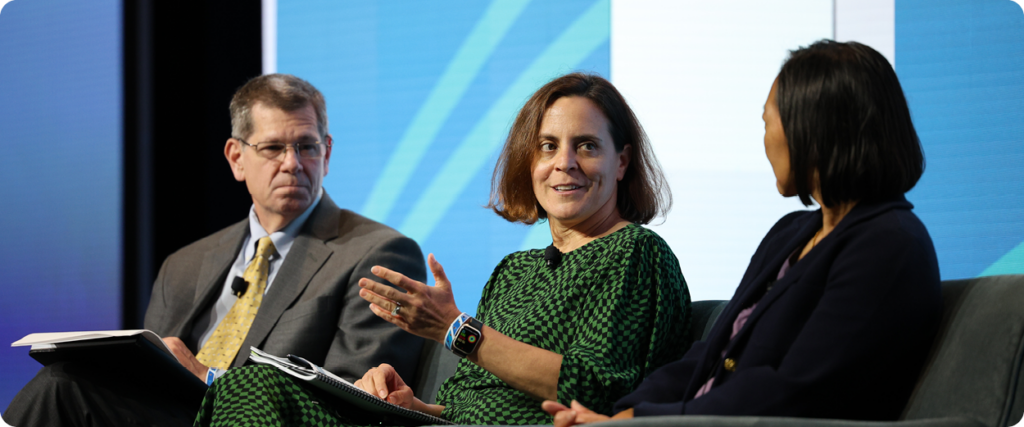
ARPA-H: Opening New Frontiers in Health Care
Program managers from ARPA-H were also featured in the day’s agenda and shared insights on the exciting and non-traditional approaches ARPA-H is taking to improve healthcare. From proactive detection of airborne pathogens using passive technology in buildings and other public venues, to reducing elapsed time on launching new health initiatives into widespread use (currently it takes on average 20 years to implement changes in healthcare), the ARPA-H team is dedicated to designing and de-risking programs that will scale in the marketplace and make a difference to patients. Emphasizing teamwork and collaboration inside and outside the agency, the panelists noted that “If we work in silos, it will never get done. We thrive on lifting each other up with ideas.”
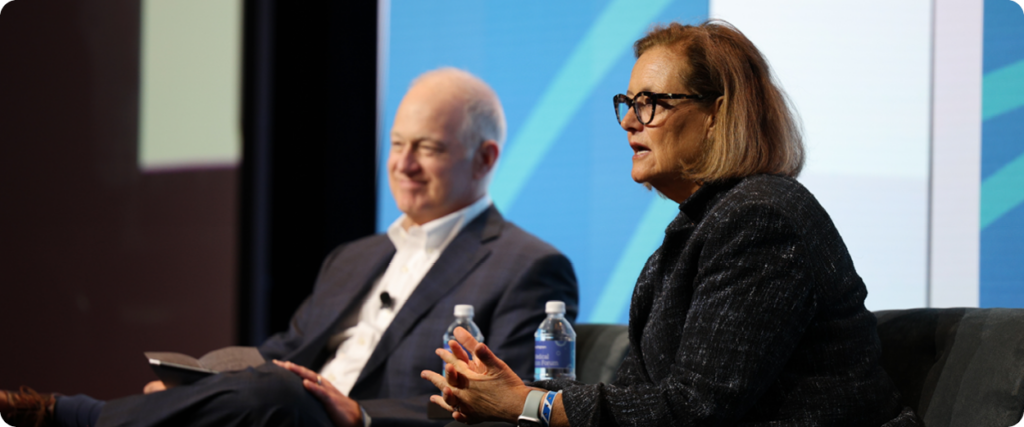
Kate Walsh, Secretary of Health and Human Services, Commonwealth of Massachusetts, joined David Brown MD, President, Academic Medical Centers, Mass General Brigham; Mass General Trustees Professor of Emergency Medicine, Harvard Medical School, to discuss some of the state’s most pressing healthcare challenges. Their conversation addressed key issues such as the recent Steward Health Care bankruptcy, the impact of social determinants on healthcare, and the pressing need for housing and healthcare support for new arrivals in the state.
“We’ve dedicated significant time and resources to finding the best ways to welcome people to our state, and many new residents are bringing valuable contributions to our economy,” Walsh shared. However, she noted that with Massachusetts having one of the lowest vacancy rates in the country, transitioning individuals from temporary shelters to stable housing remains a challenge. Addressing the healthcare needs of these populations, many of whom have experienced significant trauma, also requires careful attention. “It’s essential that we recognize the signs and provide the necessary support,” she emphasized.
Walsh also highlighted the importance of addressing social factors in improving community health. “It’s difficult to care for someone who lacks stable housing. If we want to offer hospital-at-home or healthcare-at-home solutions, we must also consider the complex social conditions that may impact a person’s safety or well-being,” she explained.
“Our ultimate goal is to improve health outcomes for everyone in the state,” Walsh concluded. “It’s about ensuring quality care and support, regardless of background.”
Watch the session: Fireside chat with Kate Walsh
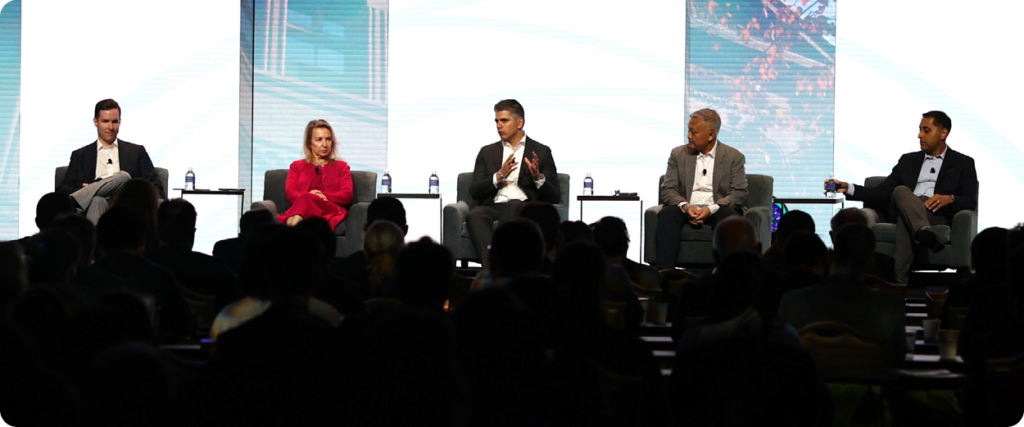
The Disruptors: Metabolic Power…Need It…Want it” moderators Alec Stranahan PhD, SMid-Cap Biotech Analyst, BofA Global Research and Caroline Apovian MD, Co-Director, Center for Weight Management and Wellness, BWH; Professor of Medicine, Harvard Medical School, were joined by panelists David Hyman MD, Chief Medical Officer, Eli Lilly and Company, Xiayang Qiu PhD, CEO, Regor Therapeutics and Harith Rajagopalan MD, PhD, CEO & Co-Founder, Fractyl Health
The ever-growing role of GLP-1 medications in treating disease was the subject of two sessions.
The Disruptors: Metabolic Power…Need It…Want it
David Hyman MD, Eli Lilly’s Chief Medical Officer highlighted the company’s progress with Mounjaro and Zepbound, calling it “exciting and gratifying” to offer non-surgical options for chronic weight management.
BWH’s Caroline Apovian MD, emphasized that while bariatric surgery has long been effective in altering gut hormones and supporting significant weight loss, GLP-1 medications are now helping those who struggle to maintain weight loss post-surgery. However, she noted that changing the practice of medicine to treat obesity as a disease is paramount and reinforced the effectiveness of the surgical option.
Two-thirds of patients discontinue GLP-1s, often due to low availability, insurance issues, cost, or the injectable format. Oral versions are currently in development, according to Hyman.
Watch the session.
The Innovation Gap: The Broader Impact of Metabolic Drugs on Related Diseases
In the metabolic panel, Harith Rajagopalan MD, PhD, CEO of Fractyl Health, envisioned new therapies targeting more mechanisms, with greater potency, improving weight management and making it easier to maintain a healthier lifestyle. “Asking everyone to diet and exercise is hard because it goes against their biology,” he said.
Watch the session.
Moderator Liz Kwo MD, Chief Commercial Officer at Everly Health, led a discussion on how technology is transforming healthcare. The panel featured Anna Åsberg, VP, AstraZeneca, Aditya Bhasin, Chief Technology and Information Officer, Bank of America, Tyler Bryson, VP, Microsoft Corporation; and Jane Moran, Chief Information and Digital Officer at Mass General Brigham.
AI was a key theme. “We use AI to help patients with heart and lung diseases,” said Åsberg. “It’s transformed our work, giving researchers more data and insights.”
Access to data, especially in plain language, has “democratized information,” Åsberg added, changing operations across the board.
Moran highlighted how observing clinicians led to solutions that reduced administrative burden. “Our providers used to spend 4-5 hours after work sorting through emails. Tools like MyChart have streamlined this and improved patient transparency,” she said, emphasizing that AI’s real impact lies in solving specific provider issues.
Watch the session: Digital Transformation
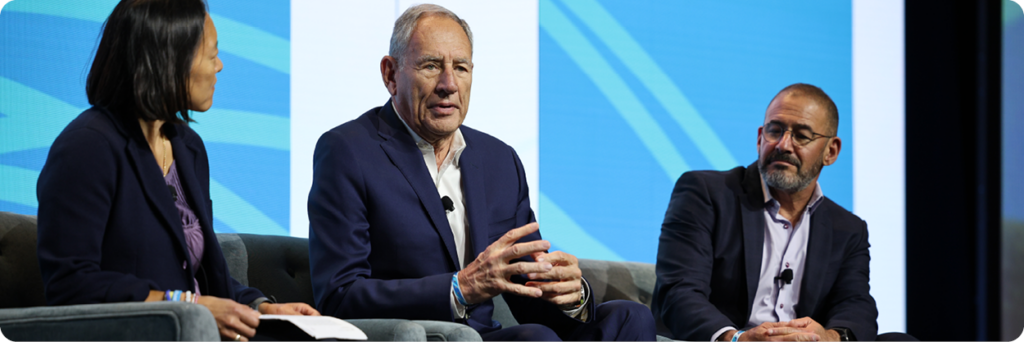
Yvonne Hao, Secretary of Economic Development, Commonwealth of Massachusetts, hosted a discussion with healthcare leaders, Delos “Toby” Cosgrove MD, former CEO of Cleveland Clinic, and Marc Harrison, CEO of Health Assurance Transformation Corp (HATCo). They shared insights on driving meaningful change in healthcare.
Cosgrove emphasized his proudest achievement: establishing the “Patients First” principle at Cleveland Clinic, guiding all decisions.
Harrison highlighted his work as former CEO of Intermountain Healthcare in Utah, where targeted investments in different areas helped address healthcare gaps. Cosgrove echoed similar challenges in Cleveland, stressing the importance of partnerships in addressing issues like food access and education.
Harrison also called for rethinking the current healthcare model. He cited a patient with asthma who repeatedly required ICU care due to dust mite allergies. The cost of dust abatement could have prevented far more expensive treatments, illustrating the need for systemic change.
Watch the session: Lessons Learned Shaping New Horizons: Visionary Change Agent Perspectives

Congratulations to John Hanna MD, PhD, Associate Professor, Brigham and Women’s Hospital & Harvard Medical School and Leigh Hochberg MD, PhD, Director of Neurotechnology and Neurorecovery, Massachusetts General Hospital; Senior Lecturer on Neurology, Harvard Medical School, the winners of the First Look Award!
Watch the presentation: John Hanna MD, PhD: First-in-Class Proteasome Inhibitors for Multiple Myeloma and Other Cancers
Watch the presentation: Leigh Hochberg MD, PhD: Implantable Brain-Computer Interface for Restoring Communication and Mobility
Michael Ryskin, Life Science Tools & Diagnostics Analyst at Bank of America, interviewed Marc Casper, CEO of Thermo Fisher Scientific.
“Our focus is on enabling customer success,” said Casper. “We’re the largest in the industry, with $1.3 billion in investments and 120,000 employees, helping researchers drive the next breakthroughs.”
Ryskin called this “the golden age of biology,” and Casper highlighted Thermo Fisher’s focus on clinical next-gen sequencing, companion diagnostics, and novel diagnostics improving human health.
Casper shared an example: “We launched a sequencer that delivers critical cancer treatment data within 24 hours. It’s widely used, including in lung cancer cases at Mass General. A powerful, practical application of our technology.”
Watch the session: Fireside chat with Marc Casper